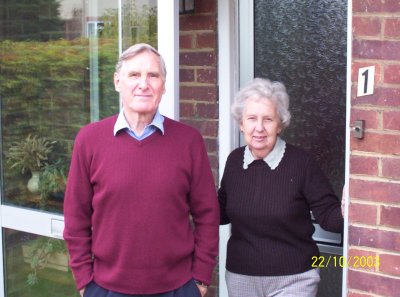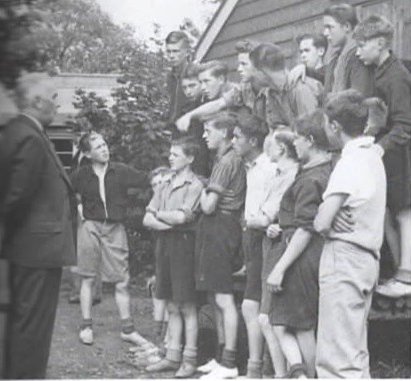The information below is taken from David’s autobiography, ‘Hostilities Only’, published in 1999.
David spent his early years in a private orphanage, which moved to Ramsgate in 1938. At the age of 13½ his guardian found him work, which included being an errand boy for the local ironmonger, which he enjoyed as it meant spending time in the fresh sea air.
It was now 1939 and he became aware that the storm clouds of war were gathering. On 3 September, David and other children from the orphanage gathered together with their guardian and listened in silence as Prime Minister Neville Chamberlain spoke. The United Kingdom was at war with Germany.
Although Ramsgate changed at the start of the war, with no street lights, no visitors and food shortages, it had very little impact on David until the summer of 1940. It was then that he saw boats going out from Ramsgate for the evacuation of Dunkirk. Every kind of boat left, both large and small, until the harbour was virtually deserted. David wrote in his book.
“By the time the first boats returned the sea front was a hive of activity. The WVS was brewing up tea and there were huge trays of mugs and tables full of bread rolls waiting. Soon the harbour was busy once again, as the soldiers and their rescuers came ashore and were wrapped in blankets and given cups of tea. Some army staff had appeared and were taking down numbers and names and trying to establish some sort of organisation. I watched as exhausted soldiers and civilians alike slumped down wherever there was space to rest. Much later on I realised that what happened next made an indelible impression on me. I could see that the sea just outside the harbour was still thronged with little boats bobbing on the waves, waiting their turn to come in, but suddenly an order was given and the men stopped coming ashore. In the area of the fish market, at one side of the harbour wall, a space was cleared, and long trestle tables were set up and covered in white cloths. Proper chairs were produced from somewhere, places were laid with cutlery and glasses, and I believe even some military silverware appeared on the tables. Then from two or three boats some senior officers came ashore and were served a full lunch. No mugs and blankets for their journey; they had obviously commandeered the most comfortable boats for their journey and now they were being entertained in the most incongruously civilised manner. Meanwhile the rest of us civilian volunteers and soldiers alike waited around for the half an hour while they ate. Then they left, the tables were cleared and the disembarkation continued. The other ranks who had been left shivering in their open boats outside the harbour wall were allowed to come ashore. This display of the army’s regard for seniority impressed me most by its callous disregard for the welfare of the ordinary fighting man.”
‘Hostilities Only: An Autobiography’, David Buckle, 1999, pp.32-33
David continued to live at the orphanage, watching the Battle of Britain from the flat roof of the house. Eventually his guardian decided that it was not a safe town for her charges and so he was told that he would be going to Bigwood Camp at Radley in Berkshire, a privately run camp and from there he would work on the land. As his guardian saw him off on the train, she told him what his real name was and this helped him many, many years later to find out about his biological family.
Someone in a small car picked David up at Radley Station and he was taken to Bigwood Camp. This consisted of about 30 wooden huts in Radley Large Wood. About 60 boys were living there. Each hut housed six boys sleeping in bunk beds and there were separate huts for the toilets, washing, cooking and eating. The only housework they were expected to do was to keep their own hut tidy. The beds were comfortable and the food was good. Although rationing was in force everywhere, in Radley there was not a great shortage of food as there was a fairly plentiful supply of vegetables, chickens and rabbits. Pigs were also kept unofficially and the meat was shared around amongst the farm workers.
The boys at the camp were supposed to be a pool of labour for the local farms and they were picked up each day and taken to local farms around Radley. The idea was that they would work for a farmer for six to eight weeks, and if found to be satisfactory they would be taken on formally.
David’s first work was at Wick Farm with Stephen Dockar Drysdale. After serving his six weeks probation he was taken on as a farm labourer and moved into the family home. Every day he got up at 5.30 am and went down to the cowshed to help the cowman with the milking (by hand at first but later some machinery was installed). After helping the cowman to clean out the milking shed, David went to the farmhouse for breakfast after which he would travel with the farmer to deliver the milk to Abingdon. After that David would help out with other farm workers on the land, hedging and ditching, etc. David enjoyed this work – he loved being in the open air and learnt a lot about the environment.
Following a difference of opinion about washing up the dishes, David was asked to leave. Fortunately, he was quickly offered a job in Blewbury but it only lasted a month as he was missing his girlfriend Beryl back in Radley. They later married. See Beryl’s wartime memories for details of their wedding.

David then started work in Radley working for Mr Greening, milking cows and doing farm work for him in Sunningwell. All this time the war was grinding on. Rationing was increasing, first clothes, then soap and petrol. The USA had joined the war and every other man appeared to be in uniform. David had joined the Home Guard but he did not feel this was a very useful contribution. He and others spent nights standing on a railway bridge over the River Thames armed only with broomsticks which would have been of no use at all if the Germans had landed.
After becoming tired of being shouted at by Mr Greening, David decided when he was 18 to join the Royal Marines. This story is told in a separate account.
